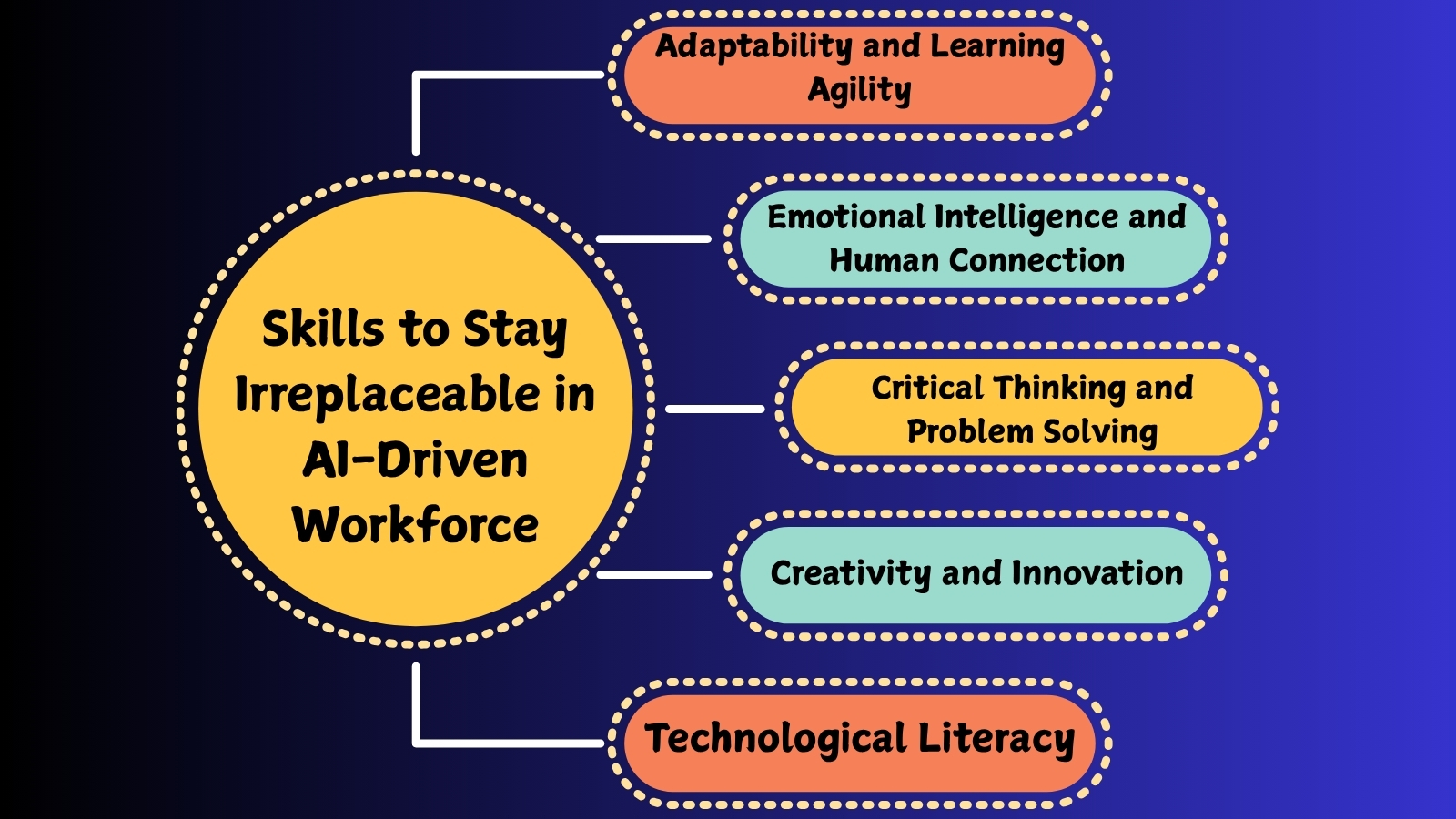The rise of artificial intelligence (AI) is reshaping industries, workplaces, and the nature of work itself. AI will play a significant role in decision-making, automation, and data analysis across nearly every sector by 2030. This brings efficiency and growth, but it also raises concerns about job security. Many roles will evolve, and some may even disappear.
However, not all human skills are replaceable by machines. Professionals who develop the right combination of technical knowledge, creativity, and interpersonal abilities will remain indispensable. This article explores Skills to Stay Irreplaceable in AI-Driven Workforce, practical strategies to build them, and how to future-proof your career.
Era of AI Dominance
Artificial intelligence is no longer a futuristic concept but a present reality. AI systems can perform repetitive tasks, analyse large volumes of data, and even make certain decisions faster than humans. While these advancements enhance productivity, they also create uncertainty for workers.
AI is expected to dominate sectors such as finance, healthcare, manufacturing, education, and retail by 2030. Routine jobs may be automated, but roles that require human judgment, creativity, and social interaction will remain essential. Workers who combine technological awareness with uniquely human skills will thrive in this new era.
Understanding the scope of AI’s influence is crucial. Professionals must anticipate changes, identify areas where AI will complement human work, and prepare to add value beyond what machines can achieve. This understanding forms the foundation for developing Skills to Stay Irreplaceable in AI-Driven Workforce.
Skills to Stay Irreplaceable in AI-Driven Workforce
The most valuable workers are those who possess skills that machines cannot replicate in a world dominated by AI. These include human-centric abilities, critical thinking, adaptability, and creativity. The following the key skills in detail.

Emotional Intelligence and Human Connection
Machines may process data efficiently, but they cannot feel empathy, inspire trust, or nurture relationships. Emotional intelligence is the ability to understand and manage your own emotions, as well as to perceive and influence the emotions of others.
Professionals with strong emotional intelligence excel at teamwork, leadership, and client engagement. They resolve conflicts, motivate colleagues, and create supportive work environments. Developing emotional intelligence ensures that even in highly automated workplaces, humans remain central to collaboration and decision-making.
Critical Thinking and Problem Solving
AI can provide answers, but humans excel at evaluating complex situations, identifying problems, and devising innovative solutions. Critical thinking involves analyzing information objectively, recognizing patterns, and making informed decisions.
Problem-solving skills allow professionals to address challenges that AI systems may not fully comprehend. Humans can make strategic choices that drive organizational success combining data insights from AI with creative reasoning. This skill is indispensable for staying relevant in the AI era.
Adaptability and Learning Agility
The post-AI workplace will demand continuous learning. Technologies, tools, and business models will change rapidly. Professionals who embrace change, adapt quickly, and continually upgrade their skills will remain competitive.
Learning agility involves the ability to acquire new knowledge efficiently, apply it to practical situations, and pivot strategies as needed. Workers who demonstrate adaptability are better equipped to navigate technological disruptions. This makes them highly valuable to employers.
Creativity and Innovation
AI can generate content and predict trends, but it struggles with genuine creativity. Human imagination drives innovation, from creating new products and services to developing unique marketing strategies.
Creativity enables professionals to think outside the box and propose solutions that machines cannot replicate. Combining creativity with data-driven insights from AI can produce groundbreaking ideas that enhance business growth and maintain human relevance in the workforce.
Technological Literacy
Understanding AI systems, data analytics, and emerging technologies is essential for every professional, even in non-technical roles. Technological literacy enables workers to collaborate effectively with AI tools, optimize workflows, and make data-informed decisions.
Being tech-savvy ensures that you remain adaptable as new AI solutions emerge. Professionals who can navigate digital platforms, interpret data outputs, and integrate AI into their work processes will be in high demand across industries.
Soft Skills to Future-Proof Your Career
The above skills are foundational, other complementary abilities can further strengthen your professional resilience.
Communication and Collaboration
Strong communication skills are vital in an AI-driven workplace. Clearly expressing ideas, providing feedback, and facilitating collaboration cannot be automated. Professionals who can convey complex concepts, negotiate effectively, and foster teamwork will remain indispensable.
Ethical and Social Awareness
AI raises ethical questions around privacy, bias, and accountability. Professionals with strong ethical judgment and social awareness can guide responsible AI implementation. Understanding societal impacts ensures that businesses use AI safely and sustainably, making human oversight critical.
Leadership and Decision-Making
AI can assist with decisions, but human judgment is essential in uncertain or high-stakes situations. Leaders who can inspire teams, set visions, and make strategic choices will be irreplaceable. Strong leadership ensures that AI complements rather than replaces human potential.
Also Read:
Common Workplace Buzzwords to Use in Corporate Life
Emerging Workplace Trends to Expect in 2026
Top Employable Graduates in India 2025
Strategies to Build Irreplaceable Skills
Developing Skills to Stay Irreplaceable in AI-Driven Workforce requires intentional effort. The following are practical strategies:
-
Enroll in online courses, workshops, and certifications to stay updated with industry trends and emerging technologies.
-
Learn to work alongside AI tools rather than fearing them. Familiarity with AI systems increases productivity and relevance.
-
Practice communication, teamwork, empathy, and leadership in daily interactions. These skills cannot be automated.
-
Take part in activities that challenge your imagination and problem-solving abilities. Creative experience enhances innovation.
-
Building professional relationships and mentoring others strengthens influence, visibility, and adaptability in your field.
Comments
All Comments (0)
Join the conversation